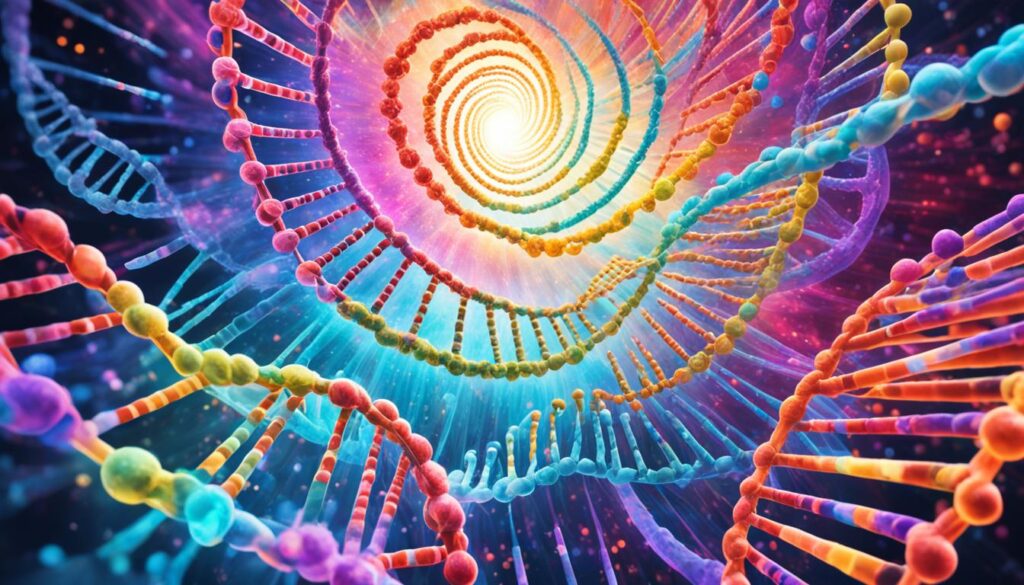Did you know that over 99.9% of your DNA is identical to every other human? Yet, this small fraction of genetic differences holds the key to your unique physical and behavioral traits. Genetic inheritance, the process by which parents pass on their DNA to their offspring, is a fundamental concept that shapes our individual identities and predispositions.
This article will delve into the science of genetics, exploring how your DNA blueprint determines your physical characteristics, predispositions, and even your risk for certain genetic disorders. From landmark events in the history of genetics to the intricacies of epigenetics, we’ll uncover the fascinating world of heredity and its impact on your life.
The Essence of Genetics
Genetics is the captivating science that delves into the intricate world of heredity, revealing how our unique biological blueprint is passed down from one generation to the next. At the core of genetics lies the study of genes, chromosomes, and the fundamental building blocks of life – DNA. This field of study has evolved tremendously, thanks to the pioneering work of renowned scientists like Gregor Mendel, whose groundbreaking discoveries laid the foundation for our modern understanding of genetic inheritance.
Landmark Events in the History of Genetics
The journey of genetics has been marked by several landmark achievements that have transformed our knowledge. The discovery of the DNA double helix structure by Watson and Crick in the 1950s unlocked the secrets of the genetic code, paving the way for advancements in genome research. The completion of the monumental Human Genome Project in the early 2000s further expanded our understanding of the complex interplay between genes and their role in shaping our unique biological makeup. These groundbreaking discoveries have revolutionized the field of genetics, empowering us to unravel the mysteries of life itself.
Epigenetics: Beyond the Genetic Code
While genetics provides the fundamental blueprint, epigenetics refers to the additional layer of regulation that can modify gene expression without altering the underlying DNA sequence. Epigenetic mechanisms, such as DNA methylation and histone modifications, can turn genes on or off, influencing how cells read the genes. Importantly, epigenetic changes can be passed down through generations, leading to heritable phenotypic differences that are not explained by genetic differences alone.

This section will explore the role of epigenetics in shaping gene expression and its implications for human health and disease. By understanding the complex interplay between genetics and epigenetics, researchers can unveil new insights into the underlying mechanisms of various inherited conditions and environmental factors that influence our well-being.
Genetic Inheritance and Disease Risk
Genetic inheritance plays a crucial role in an individual’s susceptibility to various diseases, from single-gene disorders to more complex, multifactorial conditions. While certain genetic variants can directly cause specific diseases, others may increase or decrease an individual’s risk of developing certain health issues. The interplay between genetics and epigenetics is particularly important in understanding the development of genetic and complex diseases.
The Role of Genetics and Epigenetics in Disease
Epigenetic factors, which can influence gene expression without altering the underlying DNA sequence, can also play a significant role in an individual’s disease risk. These gene-environment interactions can modulate the expression of genes related to disease development, leading to an increased or decreased susceptibility to certain health conditions. Understanding the complex relationship between genetic inheritance, epigenetics, and the development of genetic disorders is crucial for advancements in disease prevention, diagnosis, and personalized treatment approaches.
By studying the interplay between genetics and epigenetics, researchers can gain valuable insights into the underlying mechanisms of various diseases and develop more effective strategies for disease management. This knowledge can ultimately lead to improved prevention, early detection, and targeted interventions, empowering individuals to take a more proactive approach to their health and well-being.
Genetic Imprinting and Parent-of-Origin Effects
In the complex world of genetics, *genetic imprinting* is a fascinating phenomenon that reveals how certain genes can be expressed differently depending on whether they are inherited from the mother or the father. This process, known as *parent-of-origin effects*, has significant implications for human health and development.
Imprinted genes, those that exhibit *genomic imprinting*, are expressed in a unique manner, with only one of the two parental alleles being active. This selective expression can have profound impacts on an individual’s phenotype, leading to a range of genetic disorders, such as Angelman syndrome, Prader-Willi syndrome, and Beckwith-Wiedemann syndrome.

The mechanisms behind *genetic imprinting* are complex and involve *epigenetic* modifications, where chemical tags are added to the DNA without altering the underlying genetic code. These modifications can influence gene expression, turning certain genes on or off depending on their parental origin. Understanding the intricate dance of *parent-of-origin effects* is crucial for unraveling the mysteries of inheritance patterns and their impact on human health.
Genetic Inheritance and Ancestry
Genetic inheritance holds the key to unraveling the mysteries of our ancestral origins. By analyzing patterns of genetic variation, scientists can piece together the historical migrations and population admixture that have shaped human diversity. Advancements in genetic testing technologies have made it possible for individuals to explore their ancestry and genetic heritage.
The study of population genetics has revolutionized our understanding of human evolution. Researchers can now use genetic inheritance to trace the movements of our ancestors, from the ancient migrations out of Africa to the more recent dispersal of populations across the globe. This genetic blueprint provides a rich tapestry of information about the diverse lineages that have contributed to our modern gene pool.
By delving into their genetic inheritance, individuals can unlock fascinating insights about their family history and ancestral lineages. Genealogy studies, powered by the latest genetic testing tools, allow people to uncover their unique genetic signatures and connect with their ancestral roots. This knowledge can deepen our understanding of our personal identities and the broader narrative of human diversity.
Conclusion
Genetic inheritance is a captivating and intricate process that shapes our very essence, from our physical attributes to our predispositions for certain health conditions. The DNA sequence serves as the fundamental blueprint, but the dynamic interplay between genetics and epigenetics unveils a more comprehensive understanding of how our traits are inherited and expressed.
As scientific research delves deeper into the mysteries of the human genome, the potential to harness this knowledge for personalized medicine, disease prevention, and tracing our ancestral roots grows ever more promising. By unraveling the complexities of genetic inheritance and the role of epigenetics, we gain invaluable insights that can empower individuals to make informed choices about their health and well-being.
From the landmark events that have shaped the history of genetics to the emerging field of epigenetics, the journey of understanding our genetic inheritance is a profound and ongoing exploration. As we continue to uncover the intricacies of this genetic blueprint, we are better equipped to navigate the challenges and opportunities that come with this remarkable inheritance.

